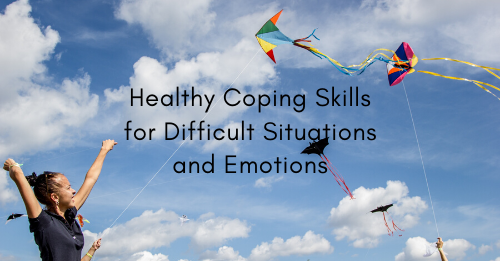During tough situations, everyone uses coping skills to manage the related emotions. Like many behaviors, coping skills can be healthy or unhealthy. While healthy coping mechanisms can help you solve the issue at hand, unhealthy coping skills can cause further harm. Anyone can benefit from learning healthy coping skills, especially during Recovery from addiction.
What Are Healthy Coping Skills?
Healthy coping skills are behaviors that we use to make sense of negative experiences in a productive and positive way. They help us manage our emotions related to difficult times to improve emotional health and help us grow as people. We’ll explore two categories of healthy coping skills — emotion-focused coping and problem-focused coping.
Emotion-Focused Coping Examples
Emotion-focused coping involves addressing your emotional response to a problem. This approach works well in situations where you can’t control what’s happening, but you can control your response. Some examples of emotion-focused coping include:
- Getting emotional support: Talking about your problem with someone you trust can help you feel better, even when the other person doesn’t have a solution.
- Recognizing and reframing distorted thoughts: Rethinking distorted thoughts like overgeneralization or all-or-nothing thinking can make a problem feel easier to overcome.
- Performing relaxing activities: Activities like meditating, your favorite hobbies and breathing exercises can take your mind off the problem to help you relax.
Problem-Focused Coping Mechanisms and Examples
Problem-focused coping targets the issue that is causing the negative emotions. A problem-focused coping mechanism tends to work best in situations where you can control the issue at hand. Consider these common methods of problem-focused coping:
- Asking someone for practical support: In addition to emotional support, another person can give you practical support like doing a task for you.
- Problem-solving: When you take a problem-solving approach, you identify the problem that is causing negative feelings and brainstorm potential solutions.
- Organization: In cases where stress comes from a task like an assignment, strategies like time management and to-do lists can make the issue feel more manageable.
Unhealthy Coping Skills to Avoid
An unhealthy coping mechanism may help with negative emotions in the moment, but it will cause further issues in the future. Instead of providing a productive way to handle the situation, unhealthy coping skills can make the problem worse. You or someone you know might practice unhealthy coping mechanisms like:
- Substance use: Drug and alcohol use can cause more negative emotions or lead to an addiction.
- Avoidance: When you avoid a problem that you can address, the issue will stay the same or become worse.
- Overeating or oversleeping: Sleeping or eating too much in response to a problem can cause you to develop unhealthy behaviors.
Learn More About Healthy Coping Strategies During Addiction Recovery
When you have an addiction to drugs or alcohol, it can be difficult to develop healthy coping strategies by yourself. An addiction treatment center like 7 Summit Pathways can help you find healthy coping skills that work for you. Find out more about our Tampa treatment center by contacting our staff or scheduling an appointment.

